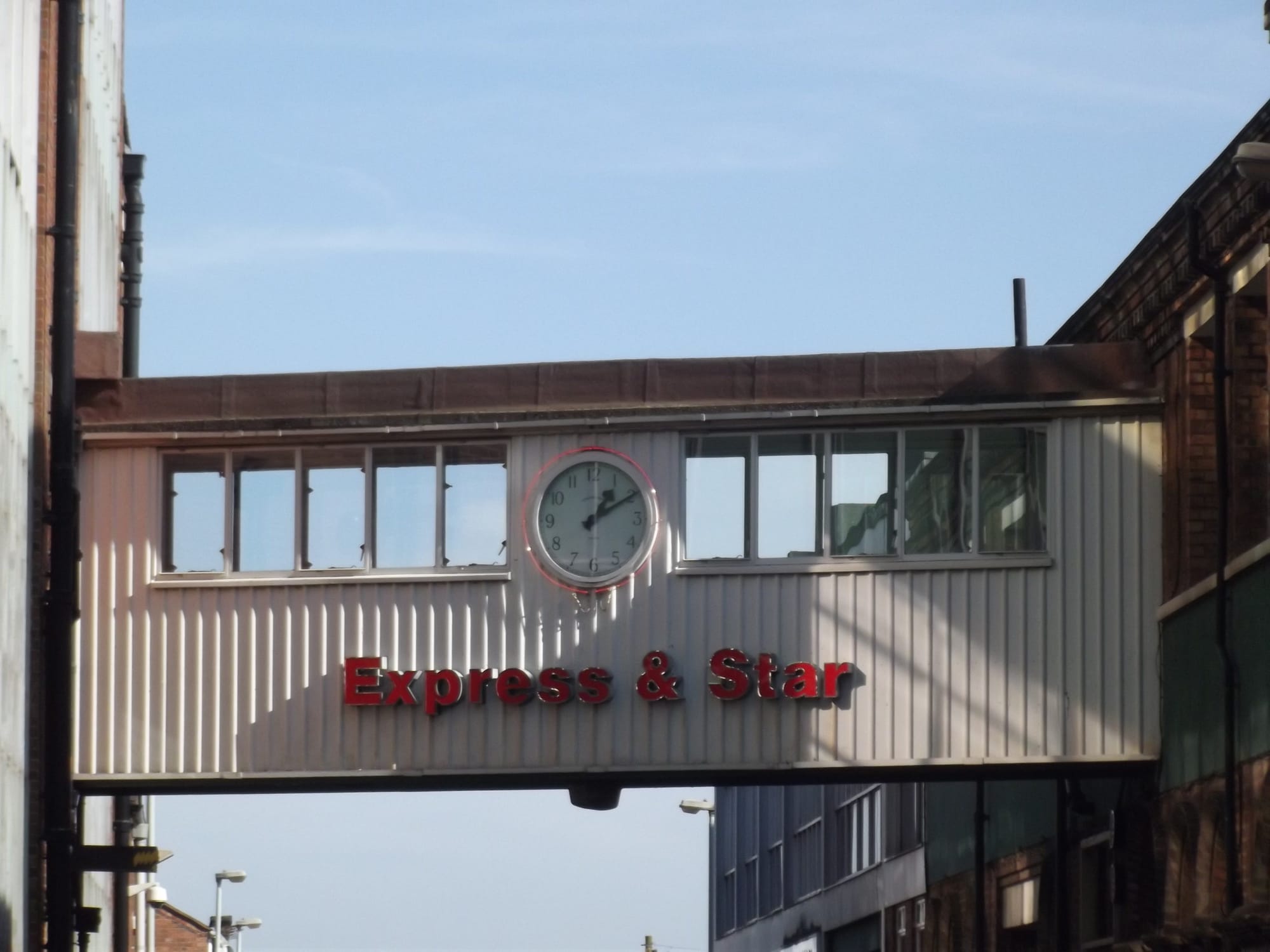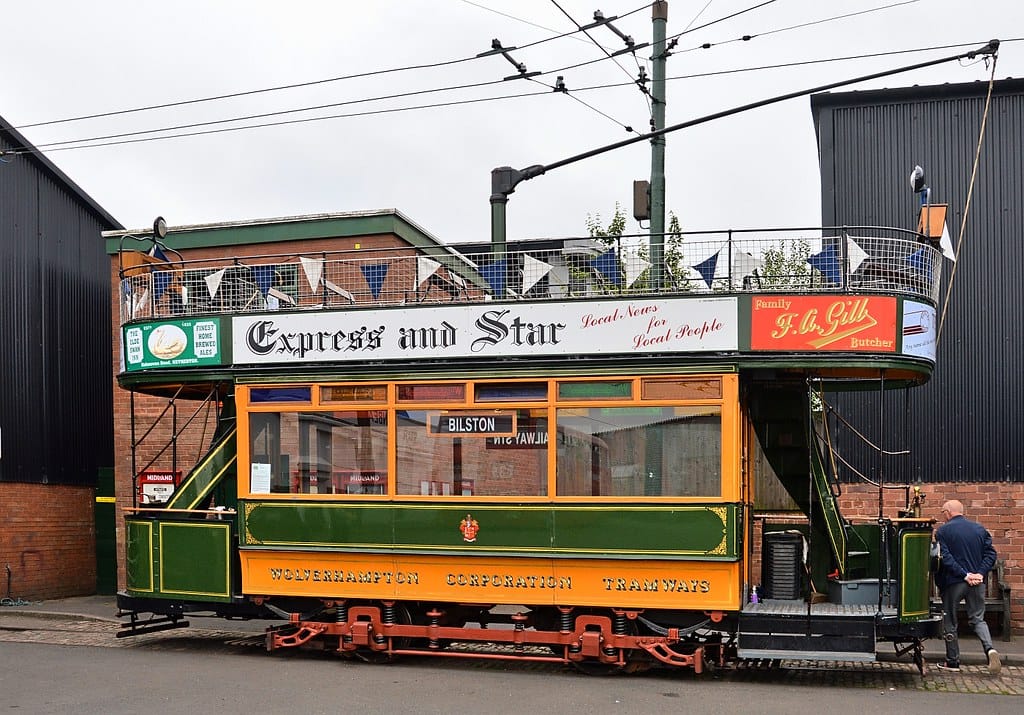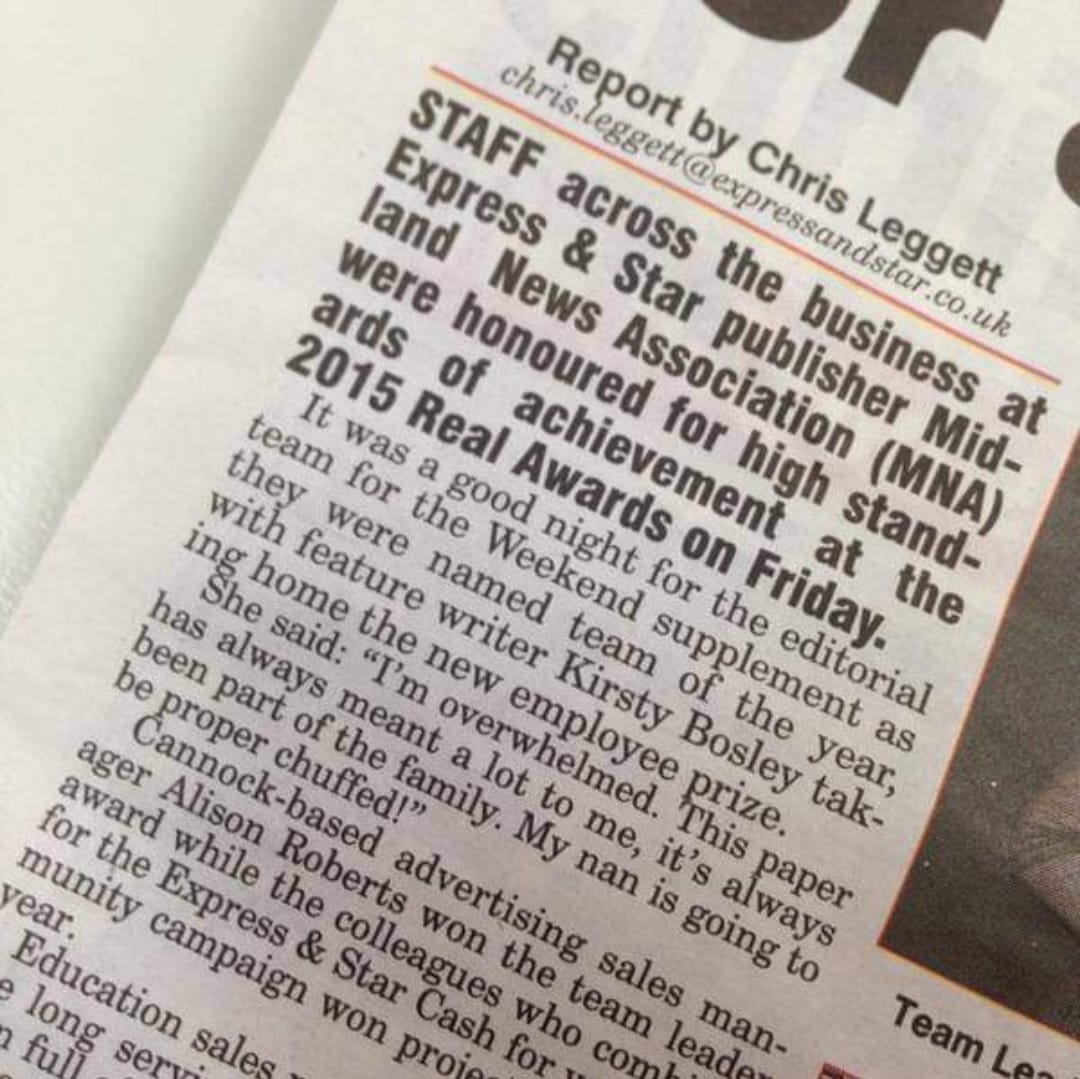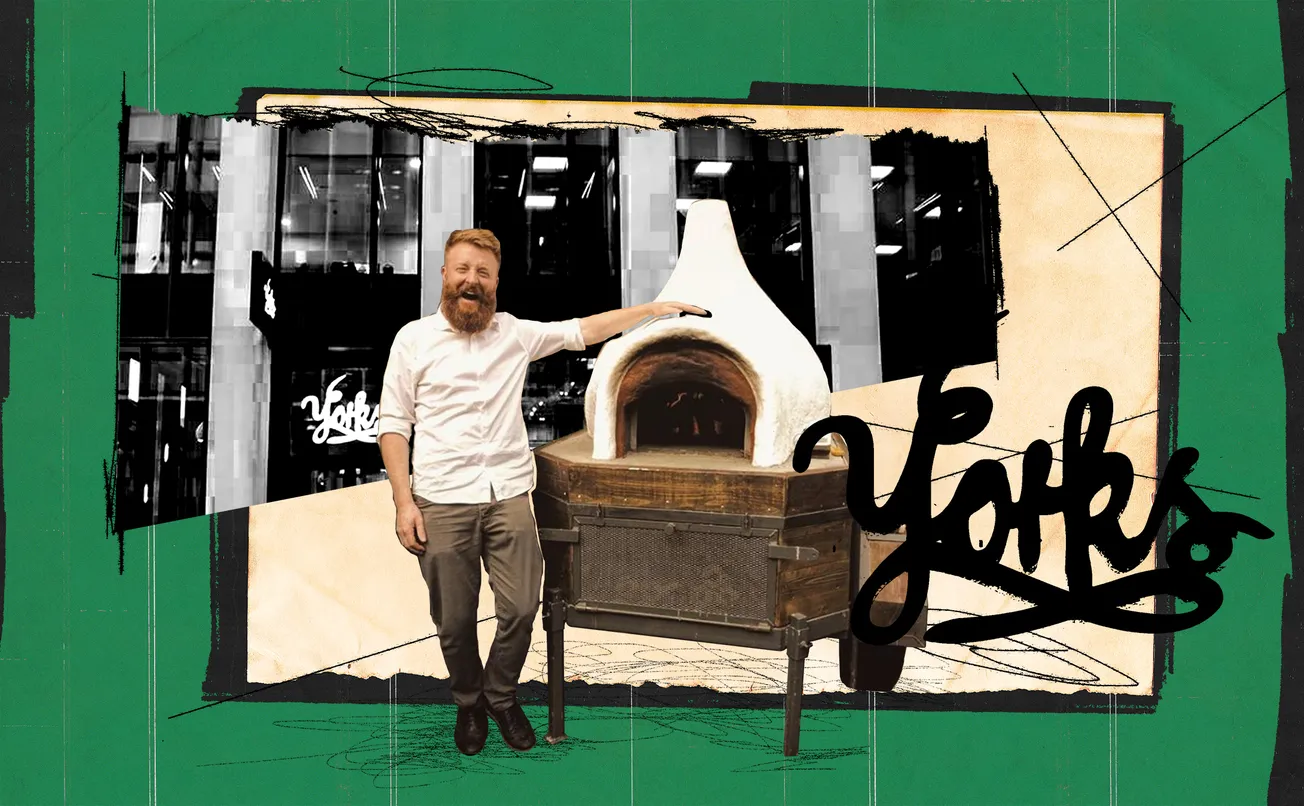By Kirsty Bosley
I remember the day I found out that the Express and Star had put its Wolverhampton office up for sale. It hurt a bit like how it hurts to find out a celebrity you loved but never knew personally has died; an ache that you could cry about if you really sit down and think about it but that, generally, doesn’t change the course of your day-to-day life. Distance grief, I suppose. Quiet and less sharp. A Sycamore Gap type of sadness.
When I read in September that the newspaper had been sold - the Graham family was relinquishing ownership after more than 140 years - sadness turned to anxiety. It’s one thing giving up on the office that has, for so long, been such a prominent feature of the city centre. But the UK’s largest independent regional news publisher suddenly no longer being independent? It felt so… anticlimactic.
Seven years have passed since I last walked through the corridors of the historic Express and Star building, smelt the print of the papers and smiled at the clanking, time-warp vintage lift I was too scared to use but loved seeing all the same. Seven years since my pals and I would steal away to an old, forgotten part of it to eat pizza and read Viz among the ghosts of journalists past, in a nook that must have, once upon a time, been a busy canteen.

We’d been rattling around in it even then. The whir of the printing presses hushed back in 2011 when operations were moved to Ketley. The clock board that once kept the newsdesk on time for each edition was as good as useless. The newspaper went to overnight printing in 2014, a month before I joined as a features writer. And yet, the little girl that lived in my heart, the same one that used to post hand-written letters to the Express and Star asking for work experience more than a decade before I was finally given access, ran up and down that place like Charlie Bucket in Willy Wonka’s factory.
Born for the job
The West Bromwich council house I grew up in was right on patch and the newspaper was really big, both in terms of its physical size (it was a broadsheet-size hulking great big thing, packed with a million stories that you’d have to employ serious tactics to consume) and in terms of readership. In 2007, it had a daily circulation of 174,989, quite impressive given the population of Wolverhampton was around a quarter of a million back then. That was the year I started my journalism training.
I remember drawing front pages of the newspaper many years before that, filling it with my own scoops, gathered in my imagination at the kitchen table when I was a child. The day the editor offered me a gig writing the Weekend Saturday supplement for the E&S and its sister title the Shropshire Star in 2014, I took a significant pay cut and almost bit his arm off in my eagerness to accept such a wicked job. There was a price I was willing to pay to work at the UK’s biggest-selling regional newspaper (as it was at the time) and I was happy to cough up, quitting the social media management freelance hustle to do what I felt I was born to do.
I loved my job. I loved being in the newsroom the night after elections, when desks were littered with pizza crusts left by knackered journalists. I relished being in there when a royal prince or a prime minister came to town, stopping off at the Express and Star because, on the campaign trail, a paper of such high standing really mattered. My responsibility was to write light, flowery features that existed only to entertain and while I never felt like a ‘real’ journalist, I loved being around people who were the best in the business.
I inherited a column and it grew, half a page a week of the giant newspaper dedicated to my – in hindsight – immature opinions. But I felt as though I had really made something of myself when I stepped through those doors.
It was a really, really tough newsroom, under management of an editor who would slam doors and make people cry. Who’d shout: “BOZZERS WHAT THE FUCK ARE YOU WEARING?!” when I showed up in a Slayer shirt instead of a suit. It wasn’t all good by any stretch of the imagination. There were stories that would make your hair curl, but I always just accepted the fact that we were, all of us, merely custodians of something bigger. Every manager, editor and reporter was just taking care of this family-run business that had served our community for so many generations. We’d all come and go, but the Express & Star was there before any of us were born and it would, with luck, outlive us all.
‘Part of the family’
Its own story began back in 1882 when one of the richest Americans in history, Andrew Carnegie (yes, that Carnegie) bought the Evening Star, a liberal Wolverhampton newspaper. He and Thomas Graham, a then prominent councillor in the town (Wolverhampton wouldn’t become a city until the year 2000), joined the publication with the conservative title Evening Express. And the Express and Star was born. It was a paper that would remain in the Graham family for over 140 years, until two months ago, when they announced they were selling up.

The new owner is National World, a company that also owns newspapers like the Yorkshire Post and the Scotsman and where journalists have recently been on strike over pay.
The National Union of Journalists said it was “stunned” to hear National World had bought the papers given that it has “shunned” discussions with the union on improved pay for members. Staff at National World are “facing increased workloads with understaffed teams and a failure by the publisher to address resulting low morale and worsening mental health.”
The newspaper’s history is glittering, but for me it’s defined by a special connection with its readers. Those who bought a copy on the day their kids were born. Who showed up to the front desk to report the death of their most precious loved ones for the obituaries. On the red kiosk in town, where a man sells copies, there's a phrase painted on the side, hidden when the headlines are in and revealed once the old news is torn out: “Part of the family.”
As a former colleague put it: “That ridiculous old slogan was true. It was where you’d send your announcements about births, marriages and funerals but it’s also what you’d use on the kitchen table when your kid was doing their painting project. It was the thing that would suddenly break the tension of a stressful day at work for your parents because they’d find something that columnist Peter Rhodes would write funny.”
The fact it was owned by the same family, after so many years, always made you feel as though you were, somehow, an extension of it. I say that both as a reader and a former employee. And yet in the news story the paper ran after the sale, it felt as far from an Express and Star piece as I could imagine. Picture any other heritage family business selling up in the region? It would have been huge.
Instead, aside from the headline declaring it the “end of an era”, the statements from both seller and buyer felt notably cold. Phil Inman, the chief executive of the Claverley Group, was quoted saying:
“The Midland News Association, including iconic Express and Star and Shropshire Star brands, has been owned and managed by the Graham family for generations. Agreeing to sell was an extremely difficult decision for the shareholders, but after careful consideration, the shareholders concluded that a larger media organisation was better placed to secure the future of the business.”
I don’t know what I’d expected. Feeling, I think.
National World chairman David Montgomery didn’t offer much of that either. He acknowledged that the Express and Star were “historic and premium brands”, but offered no word of reassurance to readers that I could see. It was just like any other dry story on the business page. “The greater scale will help underpin our accelerating transition to a multi-platform content business, focused on creative talent,” the statement continued.
“I felt so disappointed by how the Claverley Group described the sale and particularly how National World described the acquisition,” a former senior member of staff told me when I rang to chat about it. “I cringed reading it because it was the sort of utter bollocks that, if we’d have left it in a story from a press release, we’d have been absolutely chewed out over it by someone standing up on newsdesk.”
Maybe it’s pointless to read so much into the announcement of a sale – big companies are going to act like big companies, I guess. But I’m only telling you what it felt like as someone who loves this newspaper; who feels that the Express and Star is part of the place and the time I grew up in. This is an institution that matters to a lot of people – and that has a very specific story to do with the Graham family and the thousands of journalists who have worked in that old newsroom over the years.

“It was an extraordinarily anticlimactic way for a family that had set that paper up and shepherded it through generations for well over a century to go out with not a bang but a whimper,” as my former colleague puts it. “Not even that, but with management gobbledegook.”
And yet, for all my romanticising about half-empty buildings and heritage, you have to think about the reality of what it means to be a newspaper here in 2023. Is anyone getting home and seeking solace in the pages of their local paper when Netflix exists? Or rushing to buy a copy when so much breaks via notifications on your phone within minutes of it happening? The collapse of newspaper sales up and down the country would suggest not.
An industry in crisis
In the past decade, local newspaper circulation in the UK has more than halved, according to the research firm Enders Analysis. But the number that best illustrates the frightening decline of local news is one about classified advertising: the ads for cars, houses and jobs that used to pay for the vast majority of the journalism being done in our towns and cities. Here’s the stat: in the past 20 years, the revenue being earned by local newspapers from classified ads has fallen 96%. Down from £2.1 billion in 2004 to less than £100m. “Even a decade ago they were nearly £700m,” Enders reports.
What’s happened in local media in our lifetimes – really since the start of the millennium – is that the old business model for local journalism has collapsed. Thousands of local journalists have been laid off and every few months we get another grim story that one of the big local news companies has let go dozens or hundreds more staff. Some of these companies have built up huge online audiences – attracting millions of eyeballs from all over the world, but eyeballs that sadly earn a pittance in advertising revenue compared to the classified ads in the print days.
These forces have hit the Express and Star like they’ve hit everyone else. Perhaps they could have adapted better – management was “focused on print to its detriment while letting its website and social media fall to the wayside,” one former staffer told me – but really, none of the major publishers have found a way to avoid endless rounds of redundancies. It means that at every local title, fewer staff are being asked to cover more stories with less time.
Could the paper have a bright future? Some are optimistic. “Seeing someone else take the reins of that paper gives me hope that it will be forced from the Dark Ages and become a real podium in regional news again,” one journalist tells me.
Leigh Holmes, 45, has been a reader for more than 30 years and delivered the Express and Star as a kid. “If they [National World] make E&S more like the Yorkshire Post and Scotsman I don't think it's a bad thing,” he said. “It's not nice to see a family-run business sold off though.”

My hope is that National World is taking stock of all that makes the Express and Star important within the community. I want to see promises that those connections are precious and that they’ll be protected. The thought of it falling by the wayside and becoming just “Wolverhampton World” makes me want to cry.
“I worry that they don’t know enough about the history of the paper and its bond with the Black Country to care enough to help renew the brand,” my old colleague says as we chat about what all of this means now. “And make no mistake, it does need renewing.”
“I wouldn't like it to be named after a town or city,” Leigh agrees. “Black Country or Midlands maybe, but everyone knows Express and Star, it's been known around here for decades. It’d be like losing Wilko or Woolworths; you've known it all your life.”
Suddenly, the loss of a building – a glowing clock bridge icon in a city – seems like the last thing we should be worrying about. So... now what?








Comments